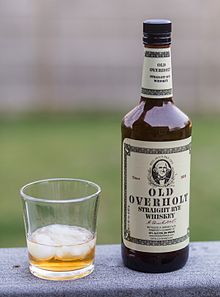Old Overholt
 |
|
| Type | Rye whiskey |
|---|---|
| Manufacturer | Beam Suntory |
| Country of origin | Clermont, Kentucky, United States (1987-present) |
| Introduced | 1810 |
| Alcohol by volume | 40 % |
| Proof (US) | 80 |
| Related products | Old Grand-Dad, Jim Beam |
| Website | theoldswhiskeys.com |
Old Overholt, said to be America's oldest continually-maintained brand of whiskey, was founded in West Overton, Pennsylvania in 1810. Old Overholt is a rye whiskey distilled by A. Overholt & Co., currently a subsidiary of Beam Suntory, which is a subsidiary of Suntory Holdings of Osaka, Japan. It is produced at the Jim Beam distillery in Clermont, Kentucky. It is one of the most commonly available straight rye whiskies in the U.S., where it is available at most liquor stores. It is aged for three years and bottled at 80 proof (40% alcohol by volume). Old Overholt has been called a "foundation stone of American whiskey" because of its long history.
Henry Oberholzer (Anglicized to "Overholt"), a German Mennonite farmer, moved to West Overton, Pennsylvania on the banks of Jacobs Creek in Western Pennsylvania in 1800. His family came from the area of Germany which specialized in distilling "korn", or rye whiskey, and Henry took up the tradition.
In 1810, Henry's son Abraham Overholt (1784–1870) took over management of the distillery and made it into a business. By the 1820s, the distillery was putting out 12 to 15 gallons of rye whiskey per day. Abraham grew the company rapidly; by 1843, Baltimore newspapers were advertising Overholt's "Old Rye"; at that time, only the very few top distilleries were advertised by name. By 1859, Overholt incorporated his business as "A. Overholt & Co." He operated out of a new distillery building that was six stories high, 100 feet long, and which could produce 860 gallons per day.
In 1881, Abraham's grandson Henry Clay Frick took over the company. As one of the country's wealthiest people, the distillery was a sentimental side-business for Frick. Frick took on Andrew Mellon and one Charles W. Mauck as partners, each owning one-third of the business.
...
Wikipedia
